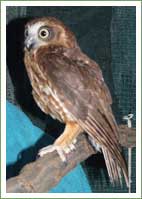Entangled Owl
Monday, May 13, 2013

A Dyraaba resident found an owl tangled in a barbed wire fence. Fortunately, the man was able to gently untangle the owl without causing further injury. He also managed to avoid injury to himself as all owls have sharp talons.
The Southern Boobook Owl had deep wounds to the skin and muscle in its wing but no ligaments or tendons were damaged. Antibiotics, pain relief and frequent changes to dressings on the wound, two trips to the vet and four weeks in WIRES care enabled the wound to heal well. The Boobook was successfully released at dusk near where it was found.
Every year, thousands of animals face a cruel death after becoming entangled in barbed wire fences. Nocturnal animals such as bats, gliders and owls are most at risk as they cannot see the fence in the dark. Other birds and animals can become entangled when they try to pass through or over the fence in the daytime.
Use alternatives to barbed wire whenever possible. When fencing for livestock, for example, consider using a combination of plain wire and electric fencing.
To reduce the risk to wildlife, avoid placing barbed wire fences on top of ridge lines, near feed trees, across wildlife corridors or over bodies of water. You can replace barbs with plain wire, cover barbs (particularly the top strand) with split polypipe or make the fence more visible with nylon sighter wires or electric fence tapes that flicker in the breeze.
If you find any animal entangled in a barbed wire fence, call WIRES urgently 1 300 094 737. Speed of reporting is crucial to the animal's survival. It is best not to remove the animal yourself. Never cut the animal or bird to rescue it – apart from causing more pain, a simple snip with the scissors can possibly sever a tendon or ligament and the animal may never recover. If possible, cover the animal with a sheet or towel so it feels less vulnerable until experienced help arrives.
Recent Posts
WIRES launches its first wildlife rehabilitation centre - Mullyang
WIRES Emergency Response in the wake of ex-tropical cyclone Alfred
International Women’s Day Volunteer Spotlight: Shelley
Tropical Cyclone Alfred – Emergency Wildlife Advice
Interview with WIRES Training and Development
Celebrating Women in Science: The Journey of Holly, Wildlife Conservationist and WIRES Team Member
